
While financial commitments by Indian companies towards philanthropy may be nowhere near that of Warren Buffet or Bill Gates, they are in their own way trying to bring about change in the lives of those less fortunate.
The Infosys Foundation, Azim Premji Foundation and Biocon Foundation are among those whose well-heeled founders are setting aside resources to bring about that change.
The Azim Premji Foundation, for instance, is understood to be managing a fund of close to $1 billion from Wipro chairman Azim Premji and has been channelling this into healthcare and education.
According to Anurag Behar, chief sustainability officer at Wipro, "There are a lot of challenges in CSR (corporate social responsibility) projects. Changes in the social sector take place very slowly. Social issues are more complex and can be frustrating for corporates."
. . .
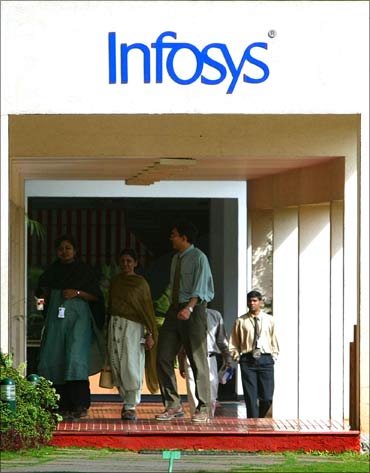
Sudha Murthy, wife of Infosys co-founder N R Narayana Murthy and chairperson of Infosys Foundation, says CSR projects are unlike technical projects where you have an aim and a deadline.
CSR projects take time and the approach is different. "You spend 95 per cent of the time researching a project, including its feasibility; 5 per cent on implementing it on the ground," says Murthy.
CSR is increasingly seen as an integral part of business strategy, with a greater focus on sustainability and engagement with internal and external stakeholders.
According to Parul Soni, executive director and practice leader for development advisory services, Ernst & Young, "Today, CSR trends towards a people-centric approach. So, you see companies giving importance to healthcare and education, as they directly benefit people at large."
. . .
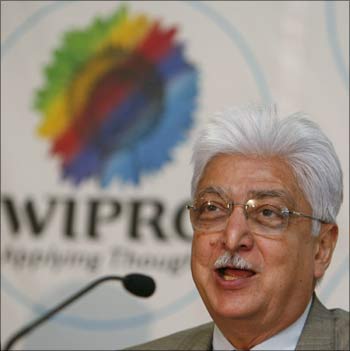
The Premji Foundation, for instance, works with states to improve the quality of education. It has touched 22,000 schools, which translates into 2.5-3 million students.
A parallel effort is the Wipro Applying Thought in Schools programme, which has reached 1,500 schools. The initiative aims to improve the quality of education, especially for the most under-privileged.
The Premji Foundation is now embarking on setting up a university, which will mould future teachers.
Meanwhile, helping to deliver high-quality healthcare has been a challenge for Infosys Foundation, which has an annual budget of Rs 20 crore (Rs 200 million). Since its inception, the foundation has initiated activities that benefit the rural and urban poor. Apart from constructing hospital wards, donating hi-tech equipment and organising health camps, the foundation distributes medicines to economically-weaker sections in remote areas.
. . .
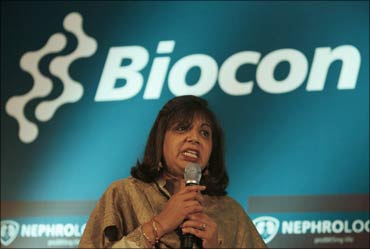
Biocon believes its CSR lies in bringing effective primary healthcare services to the doorstep of those less privileged. Most of the funds for its projects come from Kiran Mazumdar, CMD, Biocon, in her personal capacity.
Biocon Foundation, the CSR arm of the biotechnology major, runs its programmes at three levels: Preventive healthcare through education and implementation; primary healthcare through the Arogya Raksha Yojana (ARY) clinics; tertiary care through the ARY Health Insurance Scheme and a network of multi-speciality hospitals across Karnataka.
The Preventive Health Education programme is implemented through a network of community health workers hired from local communities.
"The company recognises the need for a healthcare system that is participatory, addressing socio-economic development based on preventive rather than curative care," says Rani Desai, who heads the Biocon Foundation.
. . .
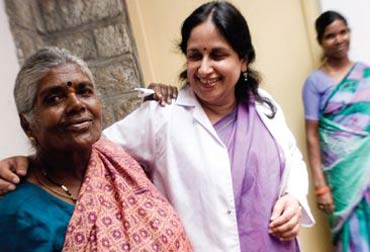
Each clinic serves a population of 50,000. Its preventive health education programme touches nearly 350,000 people every year. The foundation runs seven ARY clinics across Karnataka, each with a doctor, a lab and a pharmacy. They see over 10,000 patients every year.
The ARY insurance has a membership of 100,000. The goal is to get all members of the community to buy the insurance product, which costs only Rs 145 per person a year and covers surgery costs of up to Rs 100,000.
The Premji Foundation has also been making its mark in healthcare to a large number of villagers in Aurangabad through mobile clinics. It has also been engaging local communities in healthcare delivery.
Infosys, given its core DNA of building a knowledge economy, is also involved in spreading education.
. . .

In what is one of the largest rural education programmes in the country, Infosys Foundation has donated 10,200 sets of books in Karnataka alone, as well as in Andhra Pradesh, Orissa and Kerala under its Library for Every Rural School project.
To simplify computer education in rural areas, a separate book has been written -- it has been translated into Hindi, Tamil and Telugu -- and is being distributed under the library project.
It also has scholarship programmes for poor students. Biocon, through its Chinnara Ganitha Math self-learning programme, encourages digital literacy and encourages creative thinking through a range of activities at after-school centres for children.
The one thing binding all these initiatives is aptly summed up by Murthy: "Not having a roof over one's head is one of the worst things that can happen to you. And, without education the country cannot improve."
. . .
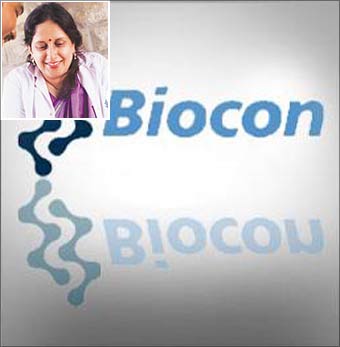
Rani Desai, Founder, Biocon Foundation
Started in December 2004, the foundation is overseen by Rani Desai. It aims to bring effective primary healthcare services to the doorstep of less privileged in both rural and urban areas.
In collaboration with the Embassy of Ireland, it has built 800 toilets in Huskur gram panchayat of Anekal taluk in Karnataka.
Biocon Foundation and Narayana Hrudayalaya also launched a health insurance scheme targeted at rural populations, starting with Karnataka in 2005.
. . .

Sudha Murthy, chairman, Infosys Foundation
Founded in Karnataka in 1996, the foundation is headed by Sudha Murthy, wife of Infosys co-founder N R Narayana Murthy.
The foundation has an annual budget of Rs 20 crore, which comes from Infosys. Anything over and above that is made good by Murthy personally. It runs programmes in healthcare, social rehabilitation and rural uplift, education, arts and culture.
The foundation has since spread its operations to Tamil Nadu, Andhra Pradesh, Maharashtra, Kerala, Orissa and Punjab.
. . .
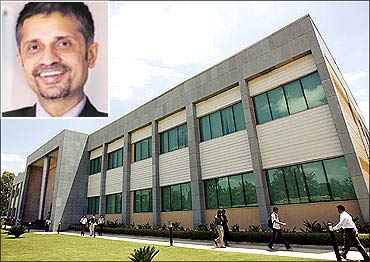
Anurag Behar, Azim Premji Foundation head
The foundation was set up with resources contributed by Azim Premji and has a corpus of $1 billion.
It focuses on creating models that significantly improve the quality of learning in schools, particularly in rural areas, in an effort to promote universal elementary education in India.
Separately, Wipro's CSR efforts are spearheaded by Anurag Behar to provide community relief and rehabilitation in times of disasters, as well as improve education, healthcare and wellness among the needy.